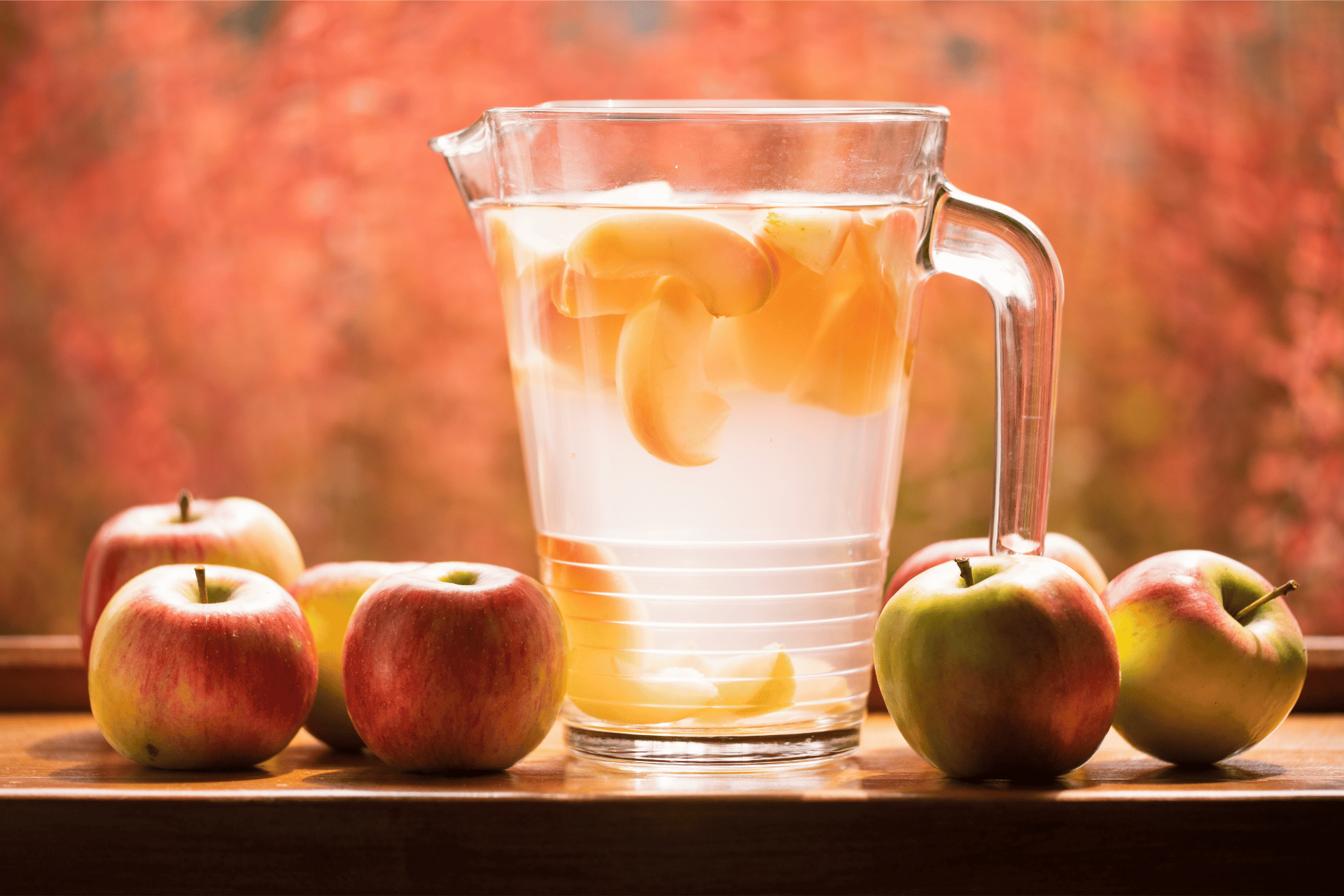Does Apple Juice Make You Poop?
Key Takeaways:
Apple juice is a well-known home remedy for constipation, especially in toddlers and children. It offers a very gentle laxative effect by providing sorbitol, water, and plenty of vitamin C.
High-quality apple juice brands and homemade apple juice also contain soluble and insoluble fiber to improve bowel movements.
Consider drinking a glass of apple juice in the morning to sustain healthy digestion.
Nutrients in apple juice that make you poop
Apple juice may support good digestion and alleviate occasional or chronic constipation. Here are the nutrients in apples that work together to promote healthy poops.
This article may contain links to products. When you purchase anything using a link on this page, I get a small commission at no additional cost to you.
1. Sorbitol (a natural laxative)
Sorbitol is a natural sugar alcohol (unabsorbable carbohydrate) found in apples and a few other fruits.
Like other sugar alcohols, sorbitol has a gentle laxative effect and promotes bowel movements by drawing water into the gut, and softening the stool.
Sorbitol is often used to treat constipation due to its gentle yet effective action on the digestive system.
2. Water
Apples are composed of approximately 80% water, making apple juice a great source of hydration.
Adequate hydration promotes regular bowel movements, helping to soften hard stools and facilitating their passage through the digestive system.
Consuming apple juice might help you poop more by maintaining proper fluid balance in the body.
3. Fibers (soluble and insoluble)
Apples are a great source of both soluble and insoluble fibers. A high fiber intake helps to feed a healthy digestive system.
Insoluble fiber, found in foods like sweet potatoes and Brussels sprouts, helps soften stool and aids in the prevention of constipation.
Soluble fiber, present in oats and peas (among many other foods), works as a bulking agent and is often used to treat diarrhea.
The high fiber content in apples of both soluble and insoluble forms helps form, soften, and transport poop through the large intestine, improving digestion and bowel movements.
It’s important to note here that these fibers are found in whole apples but not in most store-bought apple juice (unless you squeeze it fresh). A cup of fresh-squeezed apple juice has around 0.5 grams of fiber.
If you’re at the grocery store, look for cloudy apple juice. The clear stuff contains no fiber.
Related: Constipation Can Cause Diarrhea: Causes, Remedies, and Caution
4. Vitamin C
People who consume a lot of vitamin C tend to have healthier bowel habits and experience constipation symptoms less frequently than people who are deficient in the vitamin.
Unsweetened and/or homemade apple juice contains small amounts of vitamin C (around 2.2 milligrams, or 2% of the daily recommended intake). However, many store-bought brands of apple juice are fortified with 100% or more of the daily recommended amount.
Homemade vs. store-bought apple juice
When it comes to using apple juice for better bowel movements and alleviating constipation, the juice you drink matters a lot.
Store-bought apple juice may contain added sugars and preservatives, which may disrupt the natural nutrient content of the apples. These additives can potentially negate the positive effects of apple juice on digestion and constipation relief.
Most store-bought fruit juices are often made from concentrate, meaning the nutritional benefit is negligible.
Homemade apple juice is typically made from fresh apples using a juicer and results in a pure, unprocessed beverage with no additives. This form of apple juice retains all of the apple’s natural nutrients, including fibers, sorbitol, and high water content.
When choosing apple juice for its digestive benefits, opt for pure, unsweetened apple juice without any added sugars or preservatives. Better yet, try making your own apple juice at home using a masticating juicer to ensure you’re getting the max benefit to your digestive health.
North Coast Organic Apple Juice is a solid choice for a pre-made apple juice. It’s made from US-grown organic, fresh-pressed apples free of pesticides. You can even choose from traditional apple juice, honeycrisp, or apple cider varieties.
Freshly made apple juice should be consumed soon after you make it to prevent the loss of essential macro and micronutrients. It can be stored in an airtight container in the refrigerator for up to 5 days.
Read Next: Yes, Taco Bell Diarrhea Is a Thing. Here’s Why.
How much apple juice should you drink for better digestion?
According to the National Health Service (NHS), a daily intake of 150 ml (approximately half a cup) of unsweetened apple juice is recommended for improving bowel movements.
This is the optimal amount — it provides the necessary nutrients to stimulate digestion and soften stool without causing negative long-term effects on your teeth or glucose management.
Can you drink too much apple juice?
Yes, you can drink too much apple juice, especially if you’re drinking a store-bought brand high in sugars.
While apple juice can relieve mild constipation, excessive consumption may lead to side effects:
- Diarrhea: Drinking large quantities of apple juice may cause diarrhea due to its high content of insoluble fiber and sorbitol, which act as natural laxatives. Too much fructose consumption (40-80 grams per day or more) can also cause burning diarrhea. A glass of apple juice contains about 24 grams of sugar.
- Bloating: If you consume too much fructose, you may experience bloating.
- Stomach cramps: If you’re not able to absorb the fructose in apple juice, drinking it may cause stomach cramps and diarrhea. Excessive sorbitol, which can’t be absorbed by the digestive intake, can also lead to cramping. Pay attention to sugar and sorbitol levels in the foods and drinks you consume. Sorbitol is a popular sweetener in “sugar-free” foods, so you may need to cut back on sugar-free snacks if the sorbitol is causing your problem.
- IBS flare-ups: If you have irritable bowel syndrome, you should generally avoid apples. They’re a very high-FODMAP food and not recommended on an IBS-friendly diet.
- Tooth decay: Because apple juice is high in sugar and somewhat acidic, drinking it too much might lead to tooth decay and cavities. Mark Burhenne, DDS, recommends offsetting the impact of acidic, sugary drinks on your teeth by drinking a serving over 30-45 minutes, then rinsing your mouth with water.
- Blood sugar spikes: Particularly if you have diabetes or are pre-diabetic, drinking a lot of sugary beverages can negatively affect your blood sugar. Talk to your doctor about the fruit juices best for you if you know you experience significant fluctuations in blood sugar levels.
- Malabsorption of nutrients in the gut: Your gut health depends on a healthy balance of nutrients, microorganisms, enzymes, and more. Overconsumption of the sugars found in fruit juices, like fructose, can eventually lead to a problem with how your digestive tract absorbs nutrients.
Read Next: Pepto-Bismol Can Cause Constipation. Here’s What To Do About It
Enhancing apple juice for constipation relief
There are several ways you can enhance how effective apple juice is for constipation relief. By making small adjustments, such as incorporating pulp, adding water, or warming the juice, you can optimize its beneficial properties.
Incorporate pulp
When preparing homemade apple juice, add some of the pulp back into the juice. The pulp contains a significant amount of the apple’s dietary fiber. Fiber content is essential for healthy bowel movements.
Add water
You need plenty of hydration to maintain regular bowel movements, as water helps to soften stool and promote the smooth passage of waste through the digestive tract.
When you make apple juice, try adding some extra water to increase your fluid intake and further enhance the juice’s ability to relieve constipation.
This will not only help with digestion but also dilute the sugar content of the juice, making it a healthier option.
Warm it up
Drinking warm liquids has long been recognized as a helpful remedy for constipation. Warm fluids can help relax the gut and stimulate bowel movements.
Try gently warming your apple juice before consuming it. You can even add some spices, such as cinnamon or allspice, to make the juice more reminiscent of a comforting apple cider.
Other health benefits of apple juice
As long as you avoid high-sugar brands with additives, apple juice may offer some additional benefits to your health.
- High in antioxidants: Apples are high in polyphenols like quercetin and. However, commercial processing may significantly decrease the available antioxidants in apple juice. The antioxidants in apple juice are even easier for your body to absorb when the juice is fermented.
- May protect against anemia: Iron absorption and iron-deficiency anemia are common problems in the United States, especially in children. This is a pretty big deal, as anemia earlier in life is associated with neurodegenerative disease risk later in life. However, when children drink orange or apple juice with a meal, they’re able to absorb iron much better.
- Good for the heart: People who consume large amounts of apple juice have markedly lower levels of biomarkers that indicate heart disease. While drinking apple juice may not prevent heart problems, an apple juice a day can be part of an overall heart-healthy diet.
- Associated with a lower risk of cancer: Apple juice consumption is linked to an improvement in cancer-related biomarkers, specifically those related to cancers of the intestines. This seems to be related to the presence of specific antioxidants, a high amount of fiber (in “cloudy” apple juice), and pectin content.
- Nutrient-rich: Homemade or high-quality packaged apple juice is rich in important nutrients like calcium, potassium, and magnesium.
Apple juice vs. applesauce for constipation
Is it better to drink apple juice or eat applesauce for constipation? Apple juice is more likely to help with occasional constipation than applesauce. Due to its high pectin content, applesauce might actually make it more difficult to pass a healthy bowel movement.
Pectin is a type of soluble fiber found in apples and other fruits. It’s what impacts both apple juice and applesauce’s effects on the digestive system.
Apple juice, which is primarily made from the liquid extracted from apples, has a lower pectin content than applesauce. This lower pectin content, along with the relatively high fructose-to-glucose ratio and sorbitol content in apple juice, provides a gentle laxative effect that may relieve constipation.
Applesauce contains a higher level of pectin than apple juice. This is because applesauce is made by cooking and pureeing apples, which retains more of the fruit’s natural pectin. As a soluble fiber, pectin adds bulk to the stool, making it firmer and more difficult to pass.
In fact, applesauce is often recommended as a remedy for diarrhea, as the increased pectin content can help firm up loose stools.
Other beverages for good digestion
Other juices and drinks that may promote healthy bowel function include:
- Prune juice
- Orange juice
- Lemon juice, especially fresh-squeezed lemon in water or tea
- Pear juice
- Herbal tea
- Coffee
Avoid drinking anything carbonated while you’re constipated, as this can lead to gastrointestinal distress like bloating or abdominal pain.
Is apple cider vinegar good for constipation? In general, there’s no scientific evidence to support the idea that ACV relieves constipation in the average person. However, for individuals on anti-psychotic drugs or with type 1 diabetes, apple cider vinegar may speed up the digestive process.


